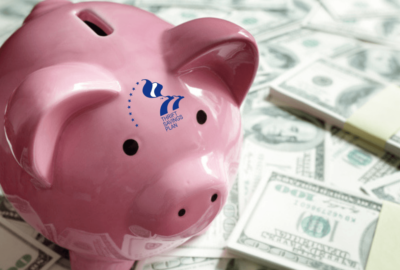How the election could affect your Thrift Savings Plan
"This whole year we have seen a lot of volatility. And particularly because a change in administration could mean a change in tax law," Thiago Glieger said.
When the stock market moves up and down, analysts always find one reason or another. Presidential elections, though, seem to consistently exert influence over market behavior. In other words, Kamala and Donald are affecting ‘your’ Thrift Savings Plan. Financial advisor Thiago Glieger joined the Federal Drive with Tom Temin to discuss more.
Interview transcript:
Thiago Glieger That’s right. It’s no secret that markets react to uncertainty and uncertainty around the election is one of the biggest things that people worry about. So it’s particularly true that before an election or even during the election year, we could be seeing things like changes in policy. There could be new tax legislation. Leadership changes are anticipated. And so that starts to get people nervous. And when investors get nervous, they become more conservative. Start going to cash, and that starts to create volatility in the overall stock markets.
Tom Temin Because in the recent few days, anyhow, we’ve seen pretty good highs and pretty strong markets. But the season, I think, has been marked by a lot of volatility.
Thiago Glieger It has. This whole year we have seen a lot of volatility. And particularly because a change in administration could mean a change in tax law. There’s a lot of laws that are still in place that if they change, could mean people are taxed differently. So a lot of folks are starting to do a little bit more planning and in preparation for changes, they take a defensive approach, meaning they just go to a little bit more cash.
Tom Temin And there’s one strange thing my own advisor pointed out at one point, and that is this is not in any way an endorsement or a favor of one side or the other. We don’t do that here, but that perhaps counterintuitively. The stock markets tend to do better during Democratic administrations, which tend to espouse more regulation and more taxes.
Thiago Glieger Yeah, and it’s really interesting when we look at some of the data, there’s some data from Fidelity talks about the volatility leading up to the election where pre-election, we’ve had as high as plus 30% or as low as -40. And post-election, the data tends to skew more towards the positive years. And this makes sense when we think about the markets in the long term. So even though pre-election and post-election things get a little bit bumpy as we start to push out further and further in time, the overall average is positive. So whether there’s one party or another, that perspective that we are going to always see a negative year under one party or another is not necessarily true when you poke out really far away. And if investors can remember that they are long term investors, instead of being very short term, then they have a better perspective on how much volatility they can take.
Tom Temin So far, neither party has managed to kill the American economy, hard as they seem to try at it.
Thiago Glieger That’s right. It’s a really interesting topic because Capital Group looked into this, and they actually show that certain sectors like technology and health care, they typically tend to underperform any of those elections. And that could be for a number of reasons, as you mentioned, policy or additional legislation that comes through. But the interesting thing, again, is over time, when you spread out the data under outperforming years in the markets or underperforming years in the markets, both administrations seems to have a pretty even base of those years, where Democratic administrations have a fair number of positive and negative years. And so do the Republican administrations as well.
Tom Temin Although, I would say it looks like there are some threats to the U.S. economy, as we understand it, for decades, we’ve been hearing how we’re moving to a service economy. But now the automobile industry looks like it could actually slip down the drain almost with electric car production. Basically, a Chinese, they’re in control of that. And then we see the major commercial airliner company in the United States. Boeing is starting to look, wait a minute. I can almost imagine bankruptcy sometime in the next couple of years if they don’t right the ship, so to speak. And then there’s reports on Intel once one of the drivers of the U.S. economy is in trouble and difficult to take over because it has plants in China and so on and so forth. But some of the pillars left in manufacturing seem to be maybe on the way out.
Thiago Glieger And we’ve seen this happen through the course of American history. We’ve had really strong corporations that have had leadership positions slowly begin to fade and have issues with fundamentals in their finances and all kinds of other various issues, which has led to their demise. And the important thing is that when we are looking at investing in any one individual company, we need to be thinking about what kind of risk do I take if I’m invested in one specific stock. This is a benefit of the TSP in that you have diversification by investing in a multitude of different stocks, like the C fund or the S fund or the I fund. That diversification allows you to, of course, be concerned about any one individual company. But that demise of that company is not going to derail someone’s financial independence simply because one company went out of business.
Tom Temin Right. So, yes, structurally the economy might be changing, but at least you can find ways to maintain your own wealth, if you will, again, by not trying to pick stocks and time stocks.
Thiago Glieger That’s right. And that’s a really important takeaway from this conversation, is that as you’re looking to the markets and as you’re looking to the election and potential policy changes and issues inside different companies, you have to apply what you know about investing principles to your own wealth. If you’re going to be well diversified, if you’re going to hold cash, you need to be thinking about how much money you’re holding in the short term versus the long term. And the idea that a Congress that could be different than the presidential seat and even a divided Congress, these are actually things that tend to do well for the markets in the long-term, which when we think about progress in the country, a divided Congress and separation from the White House means we’re not making much progress legislatively. However, the markets, if there is division, they understand that there’s probably not going to be that much change or laws being passed, which means it’s more status quo and more of same means that the markets just continue doing what they do, which is that long term accretion.
Tom Temin We were speaking with Thiago Glieger, a principal at RMG Advisors of Rockville, Maryland. And that’s a good point, Congress itself can do plenty to assuage the markets or to rattle them aside from presidential elections.
Thiago Glieger Yeah, and the concept of new tax change and all of these other elements that will affect the markets in the long run. This is something that investors begin getting worried when there is alignment between Congress and the White House, because as we know, that is when we start to see new laws being put into place. And so when there is this element of divisibility, then investors are really feeling like it’s more of the same that they are already used to, and they’re not going to be as scared about the devil we don’t know which could be around the corner and derailing everything.
Tom Temin And it kind of is a time when you hope that some of that horrible evil described as horrible corporate money that is supposed to be gripping Congress no matter what. Maybe not such a terrible thing in the sense that they’ll be a little circumspect about what they do to that golden goose, which is a golden goose for everybody in some sense. That’s right. So what is your advice then for people that are investors during election cycles, TSP people? I guess it’s maybe the hold pat.
Thiago Glieger When we think about how a federal employee should be approaching their own planning during the election years, we want to think about the principles of financial planning itself. The first thing being, I want you to look at your money through these various buckets and you say, over the next five years or so, I’m either retiring or, hey, I’m not worrying about retirement and I’m going to be working for a long time. If you have time on your hands, then you don’t have to be so worried about the short term volatility of the uncertainty of the markets. However, if you are looking at retirement, then somewhere between 12 months to as much as potentially five years, that’s what we call your short term bucket. And in that short term, we can’t know what the markets are going to do. So you don’t want to invest in things like stocks, where in 2 or 3 years from now they could be much lower than where they are today. If you’re going to use your money in the short term, you want to look to instruments like the G fund and the TSP or money markets or CD’s in the bank. Those very conservative and liquid funds can allow you to still live your life, meet your expenses and allow the markets to recover in case things go south from here.
Tom Temin Right. And you point out to the same capital group found that almost $200 billion flowing into cash in an election year. And that doesn’t sound like a real great strategy for investors.
Thiago Glieger This is the old adage of people trying to time the market. When we think about making decisions that are relative to our environment instead of what we’re trying to accomplish in our own plan. They’re pouring money, $200 billion. It was five times more the amount going into stocks is going into cash. But if you think about how counterintuitive that is, we looked at how much growth there is in the long term in the markets. Fidelity showed us that the average return in the markets after elections is positive in most of the time. So if you’re sitting in cash, you’re going to miss out on that growth. And if you miss only ten days of the best growth days in a year, you actually miss out on more than half of the growth available in that year. And if you do that for a few years in retirement here and there, that could be enough to really change your plans in the long run.
Tom Temin Yeah, you could ratchet yourself down, trying to be overly cautious, in other words.
Thiago Glieger That’s right. So having a plan that you can stick with is really important, because it’s challenging to experience that risk in the short term. We always talk about this concept of I can be an aggressive investor or I am not necessarily as risk averse. Well, the idea of that is very interesting until you actually get punched in the gut when the markets fall through. And can you actually stick with that plan? The bigger emphasis you put on your short term bucket, the more likely you’re going to be able to keep yourself calm.
Tom Temin And in terms of that cash idea, I guess the same rule of thumb that applies in normal times. You need some cash, some liquid assets for emergencies that hit you personally or the ATM network goes down for something for two days, which it could any time. But that’s different from your investment strategy. That’s your cash strategy, which sounds like you shouldn’t mix with your investment strategy.
Thiago Glieger You should have somewhere between three to six months worth of your living expenses in cash in the bank. There is argument to have some physical cash at home in case there’s emergencies, floods, things like that. There’s no electricity. That’s good, too. When you look at the five years worth of short term, you don’t want to hold that entire amount in the G fund or in cash. That’s probably more cash than you need. So then you want to think about that in terms of your portfolio. What other short term or conservative investments can help me still have that short term bucket filled, but not be completely held in cash and losing purchasing power every year.
Tom Temin And maybe just for peace of mind and good investment strategy don’t watch all the political news.
Thiago Glieger That’s right. Stay away from that TV.
Copyright © 2024 Federal News Network. All rights reserved. This website is not intended for users located within the European Economic Area.
Tom Temin is host of the Federal Drive and has been providing insight on federal technology and management issues for more than 30 years.
Follow @tteminWFED






